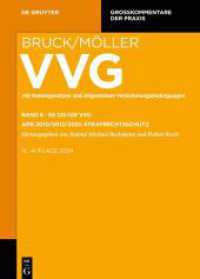Full Description
Situated within the long-established domain of temporality research in Second Language Acquisition, this book aims to provide an update on recent research directions in the field through a range of papers which explore relatively new territory. Those areas include the expression of modality and counterfactuality, the effect of first language transfer, aspectuo-temporal comprehension, aspectuo-temporal marking at a wider discursive level, and methodological issues in the study of the acquisition of aspect. The studies presented explore English and French as second languages, involving both child and adult learners from a range of first language backgrounds in both instructed and naturalistic learning contexts. The studies draw on both spoken and written data which explore various facets of the learners' second language comprehension and production. The volume offers new, but complementary insights to previous research, as well as pointing to directions for future research in this burgeoning field of study.
Contents
1. Tense, aspect and modality in second language acquisition: An overview (by Howard, Martin); 2. Beyond individual form-meaning associations in L2 Tense-Mood-Aspect research (by Bardovi-Harlig, Kathleen); 3. The grammatical representation of aspect: Context-focused analysis of decontextualized prompt sentences (by Salaberry, M. Rafael); 4. Issues in the acquisition of grammatical aspect in Greek-English bilingual children (by Dosi, Ifigeneia); 5. Is it really easier to acquire a closely-related language?: A study on the expression of iteration and continuation in L2 French (by Benazzo, Sandra); 6. 'It starts to explode.' Phasal segmentation of contextualised events in L2 English (by Vanek, Norbert); 7. The acquisition of modal auxiliaries in English by advanced Francophone learners (by Ayoun, Dalila); 8. Using the present tense to talk about irreality: Differences and similarities across the L2 grammars of Italian learners of French (by Repiso, Isabel); 9. Index








